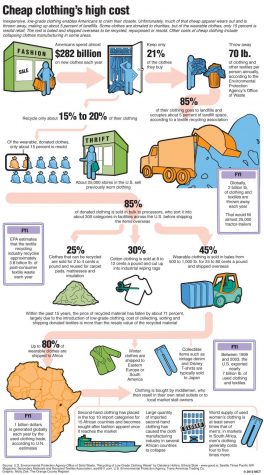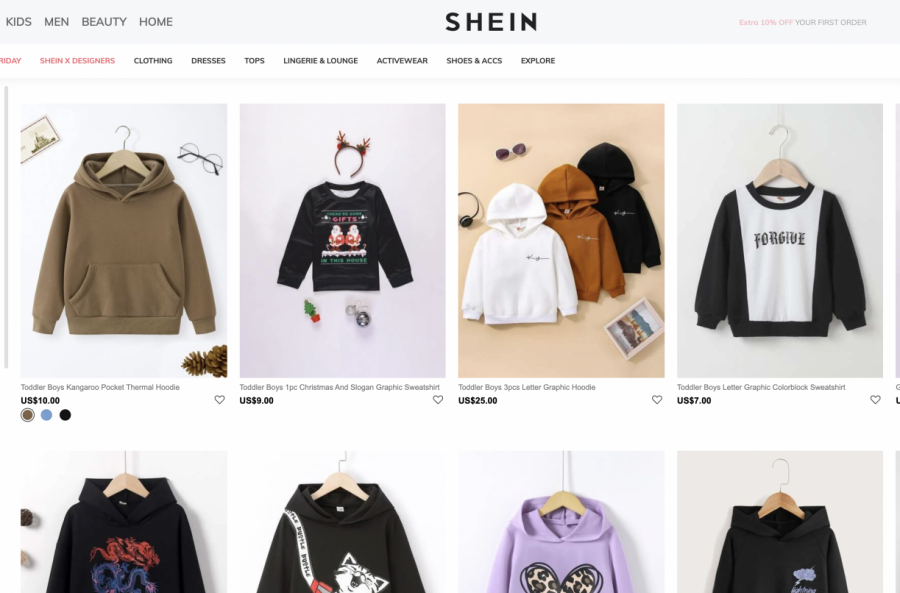The Cost of Great Bargains
The ethical corruption of SHEIN’s fast fashion business model
Shein’s current home page showcasing their new arrivals, including cheap apparel for the upcoming holiday season. The “New In” tab is constantly updated with their daily new styles. Screenshot of Shein’s webiste.
November 22, 2021
If you’ve ever purchased from brands like Urban Outfitters, H&M, Topshop, Forever 21, and many others, you’re no stranger to one of this generation’s biggest ethical challenges: fast fashion. This is an umbrella term to describe a highly profitable and exploitative business model based on selling high-fashion fads and trends through mass-production and extremely low costs. One of the most corrupt stores in the fast fashion business is Shein, a $15 billion company that has been in operation since 2008. Other than their wildly low-priced products, Shein has many other issues on their hands, like their utilization of sweatshops, their insensitivity towards race and religion, and the harmful effects they have on the environment.
Shein is able to offer merchandise for as little as $3 because they control their own supply chain. Supposedly bringing in over 2,000 new styles a day, the company is able to grab your attention and make profits like no other, especially thanks to their reduced overhead funds due to it being exclusively online. Shein is also way ahead of the game when it comes to competition with other stores. Where a $30 dress at Forever 21 already seems like a good deal, Shein will sell essentially the same product for just $9.
Sophomore Olivia Rogers, who no longer participates in buying from Shein, describes their product line as “fad clothing items that are tacky and cheap.”
Not only are they reducing prices based on their supply, the quality of their merchandise allows them to greatly over-produce and sell much more than necessary. Sophomore Connor Lander knows that Shein’s quality isn’t the best, but it’s worth it for the great prices.
“The quality was good, but at the same time it’s a little crappy. It most definitely compares to the price,” Lander said. “I know people who wear LuluLemon shorts that are $60-70. Shein might not be as good quality, but it’s still solid and you can get shorts for $13.”
Their overproduction habits might be a benefit for your wallet, but it is a detriment to the environment. Mass production is helpful for a company that sells such cheap merchandise, which is exactly why it’s so harmful to the environment when not all of a product can be sold. Senior Ryan Smith describes these practices as a growing problem in the clothing industry.
“There are some places that are so careless with making clothing that they use textile water that has toxic materials like mercury, arsenic, and lead which is toxic to us and other animals,” Smith said. “The clothes go out of fashion so quickly that these companies will dump the leftovers into landfill in mass amounts.”

This production process is one of the major deterrents from the company as a whole. Many people find that they use a very unsustainable and unethical way to produce clothing.
“I didn’t want to shop there anymore because it’s not very good for the environment and because of their overproduction practices; they make so much of a product and it all goes to waste,” Rogers said.
The amount of merchandise that goes to waste is not even the only environmental conflict that Shein contributes to. According to the Shein website, the clothes are made in China and then “loaded onto a cargo plane for a speedy transcontinental voyage to you.” They transport shipments all over the world and so frequently, which only increases their carbon footprint.
In accordance with Shein’s website, they claim to “adopt reasonable measures to reduce or mitigate the impact of their operations on the environment, and be committed to continuously improving the environment.” However, these claims are extremely vague, and Shein has been proven time and again not to be environmentally conscious by any means.
Shein has also been notorious for being extremely culturally insensitive. One of their more well-known conflicts with the general public is their sale of a necklace with a swastika pendant for $2.50. This greatly upset the Jewish community, as it is a deliberate and direct act of antisemitism.
This was first brought to the attention of social media on July 9, 2020 and it created an uproar on Instagram and Twitter. The next day, Shein apologized on these platforms by claiming that the pendant was a Buddhist symbol, not an antisemitic one. The necklace was allegedly removed from their website, but still caused a lot of hurt in the Jewish community and its allies.
Not only this, but a week prior to the swastika incident, Shein was called out for selling rugs that looked similar to Muslim prayer mats. Some of the offensive descriptors they used in order to profit off of these rugs were “fringe trim carpet,” “fringe trim Greek fret carpet,” and “fringe trim graphic carpet.” Some of the rugs even had illustrations of mosques and the Ka’bah, which is considered the most sacred place on Earth in the Islamic faith. The sale of prayer mats was majorly disapproved of because they are treated with the utmost respect in Muslim households and are used to pray on five times a day, and were being sold as a casual house rug.
As if things couldn’t get any worse, Shein has additionally been known to use highly unethical business practices such as child labor and sweatshops. Senior Jadyn Wallis also details their poor treatment of employees and how that contributes to their production methods.
“It’s cheap because it’s made in countries that don’t have labor laws and they pay the employees very little or nothing at all to make the clothes, so they don’t have to charge a ton to sell them,” Wallis said.
Shein has adamantly denied these practices, but when one of their main factories is in Bangladesh, a country that allows children as young as 14 to work in factories, this has been put into question many times.
After learning about their harm towards the environment as well as their abusive and corrupt business practices, Lander is still excited by their rock-bottom
prices, which keeps him an avid customer.
“I would say that that’s bad, and I feel bad saying it, but I don’t think it impacts my decision to shop there,” Lander said.
This is likely a common feeling among people who have heard about Shein, because it is very tempting to buy a cute top for $6. Teenagers especially, who get paid minimum wage or don’t work at all, are constantly looking for ways to save money. And what better way than a store that sells trendy clothing for under $20?
All that being said, there most definitely are alternatives for relatively cheap clothes that do not put a dent in your moral reputation. Thrift stores, local small businesses, and even some department stores carry just as much on-trend, reasonably priced merchandise while still meeting and maintaining ethical standards.



